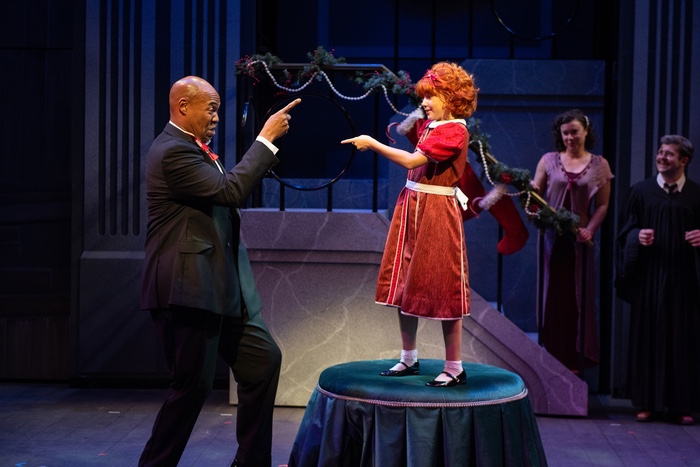
Terri Kent, the artistic director of Porthouse Theatre, Kent State University’s summer home on the grounds of Blossom Music Center, states in her program notes for Annie, “I believe the arts have the power to transform lives and I believe in miracles.”
Kent, therefore, chose to end the venue’s “Miracles! Season” with the tale of an orphan named Annie, who, through guts, gall and cuteness, charms herself in miracle-like fashion into the life of Oliver Warbucks, the mid-depression billionaire, and in the process outsmarts the conniving orphanage matron Miss Hannigan and her dastardly brother Rooster.
Annie, the musical, is loosely based on “Little Orphan Annie,” a daily comic strip created by Harold Gray. “The strip took its name from the 1885 poem “Little Orphant Annie” by James Whitcomb Riley, and it made its debut on August 5, 1924, in the New York Daily News.” With its commentary on politics, American life and depression angst, the strip, in contrast to many of the escapist writings and illustrations of the comics genre, attracted adult readers, rather than children.
If you were a reader of the comics version of the story, don’t go expecting any strip you’ve read in the newspapers, as book writer Thomas Meehan used only the characters of Annie, Oliver Warbucks, and Sandy in his plot, and wrote an original story with new personae.
The Meehan tale is set in New York during the downbeat Great Depression. The author stated that he saw “the character of Annie as a 20th-century American female version of the titular orphan characters created by Charles Dickens in works such as Oliver Twist and David Copperfield, with the mystery of Annie’s abandonment and unknown parenthood as consistent with a strand of mysteries in Dickens’ tales.”
It’s “1933 in New York City, eleven-year-old Annie is housed in an orphanage. When six-year-old Molly wakes up from a bad dream, Annie comforts her by singing about her own parents; even though they abandoned her at the orphanage as a baby, she holds on to the hope that they will come back for her.”
Annie decides to escape to search for her parents, but is caught by Miss Hannigan, the alcoholic, nasty matron of the institution. Annie finally does sneak out of the orphanage, wanders the streets, finds a dog which she names Sandy, is caught and brought back to Miss Hannigan, is chosen by Grace, Mr. Warbucks’s aide, to be a guest at Warbucks’ home as a guest orphan for the Christmas holidays. And, as we all know will happen, she charms the man, his staff, President Roosevelt and the audience, is adopted and becomes a non-orphan. “Leapin’ lizards!”
Ah, to live in the world of comics and miracles!
Annie opened on Broadway in 1977, won seven Tony Awards, including for Best Musical and ran for nearly six years. It spawned a national tour, international productions and numerous community and little theater productions. The musical’s songs “Tomorrow” and “It’s the Hard Knock Life” are among the most popular tunes of Broadway.
The Porthouse production, under the focused direction of Terri Kent, with artistic collaboration and choreography by Martin Céspedes, gets a warm and comfortable staging. The negative thoughts of the script are minimized and the positive is stressed. Even Miss Hannigan’s obnoxious ways are downplayed. This approach minimized some of the humor, but left the “miracle” aspects present.
First and foremost, the role of Sandy, the stray dog, is played by Bean Kent (Kent? Oh, yes, the director’s own sandy colored poodle, who had its own director — AB Dog Training). Bean’s entrance was deservedly met with appropriate “uhhs and ahhs!” The obedient animal was well-behaved and seemed to relish the attention.
Parker Towns, who is double cast with Ava Kimble, made for an adorable and winsome Annie, the day I saw the production. (Ava Kimble plays the role when Kimble plays July.) She has a strong singing voice and developed a consistent characterization. (But, where were the head of ringlets and signature Annie dress?)
Dante J.L. Murray, who recently lit up the Porthouse stage as Pontius Pilate in Jesus Christ Superstar has a big voice and was convincing as Daddy Warbucks. Courtney Elizabeth Brown was charming as Grace Farrell. Amy Fritsche was properly obnoxious as Miss Hannigan, as was Matthew Gittins as her brother Rooster, though I would have liked for each to have played the roles with more exaggerated farce. The orphans were delightful.
Martin Cespedes’s choreography, a little more subdued than his usual work, was filled with his signature creativity.
Capsule judgment: There is no “Maybe” about it, since “You’re Never Fully Dressed Without Smile,” get down to Porthouse Theatre, today, not “Tomorrow,” to see the “Little Girls” (and the rest of cast) of Annie, do their thing.
Annie runs through August 4. For tickets go to porthousetheatre.com or call 330-929-4416.
[Written by Roy Berko, member: Cleveland Critics Circle, American Theatre Critics Association]